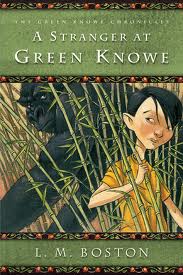A Stranger at Green Knowe does, I must say, start out on a strange note for a Green Knowe book, given that it starts not at that old and magical house, but rather deep in the African jungle with a family of gorillas.
A few jumps, roars, mildly questionable if well meaning descriptions of human African natives, and enthralled descriptions of the African jungles later, and poor little Hanno the Gorilla finds himself captured by a white hunter and taken to the London Zoo. His little sister gorilla doesn’t make it.
If you are thinking that this is one sad start to a children’s book, and that author Lucy Boston really, but really, did not like the practice of keeping animals in zoos, you’d be on the right track. It only gets sadder from here.
Matters for the very sad Hanno don’t really improve when he is visited by Ping, the refugee boy from Burma/Myanmar first encountered in the previous book. Ping feels an immediate bond with the gorilla. Unlike his friend Oskar, Ping isn’t white, and thus, he has not been adopted or fostered out, but remains in a grim institutional setting, where he has now completely accepted the name Ping since no one can be bothered to learn how to pronounce his actual name.
Sidenote: After mostly avoiding race in her previous books—even as she included an Asian character—Boston comments frequently on it here. Apart from the bit about the African natives and Ping’s race creating issues, a later conversation between white adults discusses whether or not Africans will take over the world next—accepting this as a probability, and not something that can or should be avoided. Another small section tells Ping’s history in Burma in cold, direct language. Yet despite those scenes, the overall message is of tolerance and acceptance, especially of refugees who, like Ping and Hanno, arrived to the UK in part because of British policies—as shown through the tolerance, acceptance and finally love Mrs. Oldknow and the magical house show towards Ping.
Anyway. Fortunately for Ping, his friend Ida (also from the previous book) still remembers him, and has written to Mrs. Oldknow, owner of Green Knowe, asking if she can accept Ping for a holiday. The warmhearted Mrs. Oldknow can, and soon, Ping is on his way back to Green Knowe. Coincidentally, at about the exact same time Hanno the Gorilla makes a run for it. And by a further major coincidence, the gorilla ends up at Green Knowe as well.
Maybe not that much of a coincidence. Green Knowe is magical, after all, and the book later establishes that really, England doesn’t have that many places for gorillas to hang out.
Ping, who felt an immediate bond with the gorilla, immediately decides to help out the gorilla out. This immediately runs into two problems: one, gorillas eat a lot, and two, as I noted, England doesn’t have many gorilla hideouts, making the thicket where the gorilla is hiding a rather obvious spot. Ping also has to try to keep the gorilla from eating poisonous yew. He deals with the food problem by stealing several things and sharing his lunch—and pretending to be hungrier than he is—but he has no ability to keep the gorilla hunters, concerned about public safety, out of Green Knowe.
This all leads to, as I hinted, a very sad ending, especially for anyone fond of gorillas. Animal lovers might want to avoid this book. But that, I think, was precisely Boston’s point: once Hanno is removed from the jungle, he has no good options—especially since no one, even Ping, is doing anything to get poor Hanno back to the jungle. And even Ping is just a powerless kid, something that frustrates him deeply.
And yet, for a couple of days, Ping does have the power to help Hanno. It isn’t much, and it is ultimately frustrating, but it is more power than Ping had in his institution, and it does allow him to do something, however fleeting that something might be.
I really cannot recommend this book for animal lovers, but the writing, as always, is lyrical and moving, and if the ending can’t be called happy, it is realistic—and it is, at least, mingled with a few hours of happiness for boy and gorilla.
Mari Ness is relieved to inform you all that she has never run into gorillas hiding in her back yard. She lives in central Florida.










